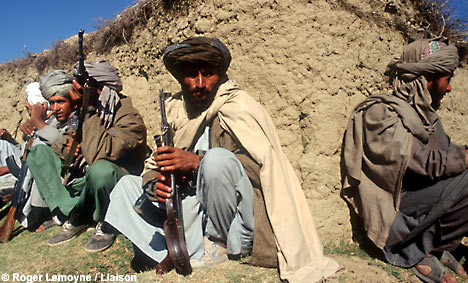Afghan President Ghani Offers Olive Branch to Taliban
Afghan President Ashraf Ghani invited the Taliban to join an Afghan-led peace process

NEW DELHI: Afghanistan’s new president, Ashraf Ghani, speaking at a conference on Afghan peace and reconstruction in Beijing, referred to the Afghan Taliban directly whilst making a comment on the troubled country’s progress toward peace.
“Peace is our highest priority. We invite the political opposition, particularly the Taliban, to join and enter Afghan dialogue, and ask all of our international partners to support an Afghan-led and Afghan-owned peace process," Ghani said.
"We must not and will not permit groups pursuing grand illusions to use our country as the battleground or launching-pad against the international system,” the Afghan president added.
Although Ghani’s position toward the Taliban is portrayed at variance with that of his predecessor -- Hamid Karzai -- the comment in Beijing is indicative that Ghani, like Karzai, is keen to draw the Taliban into a dialogue that remains Afghan-led.
Karzai had on several occasions appealed to the Taliban to “join the peace process and live with honour with their brothers and sisters.”
The Taliban however, considers the Afghan government illegitimate, and has been stepping up attacks leading up to and after the recently concluded Afghan elections, which it had denounced.
Recent attacks have included six police officers and two civilians who were killed in two separate attacks a day after the Taliban ambushed a police convoy about a week ago. A few days earlier, 22 security force members in Sar-e-Pol province north of Kabul were killed by Taliban insurgents. The attack, in turn, followed a bomb in Kabul on the same day that killed one civilian.
Other attacks in recent weeks have been an attack that killed three soldiers belonging to the United States-led International Security Assistance Force (ISAF) in September, a suicide bombing that killed Karzai’s cousin Hashmat Khalil Karzai, the shooting of 15 civilians, two Finnish relief workers, an attack on the Kabul airport, and one of the deadliest attacks since 2001 wherein a sports utility vehicle detonated in a busy market in Paktika province, eastern Afghanistan, that killed 90 people.
Speaking at the same conference in Beijing, Chinese Premier Li Keqiang addressed this volatile situation in Afghanistan, and whilst reiterating Afghanistan’s ability to solve its own problems, said that the country’s neighbours should help create an environment conducive to peace in the region.
"The International community should respect Afghanistan's sovereignty, independence and territorial integrity, not interfere with its internal affairs and support Afghanistan's efforts to realize security and stability," Li said.
China’s hosting of the conference and Ghani’s visit to Beijing -- his first international visit as President -- are indicative of China’s growing interest in Afghanistan, especially as a bulk of the US-led foreign coalition is set to withdraw at the end of the year following the signing of the Bilateral Security Agreement (BSA). China’s interest in the region is in Afghanistan’s estimated $3 trillion in mineral wealth, and strong ties with the government in Kabul can safeguard China’s economic interest as well as its political given the prospect of unrest in Afghanistan spilling over into China’s restive northwestern region of Xinjiang.
On Wednesday, China announced that it would be providing $330 million in grants to Afghanistan along with professional training and scholarships for 3500 Afghans over the next five years.



